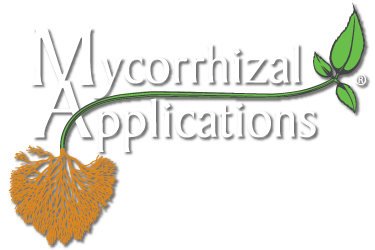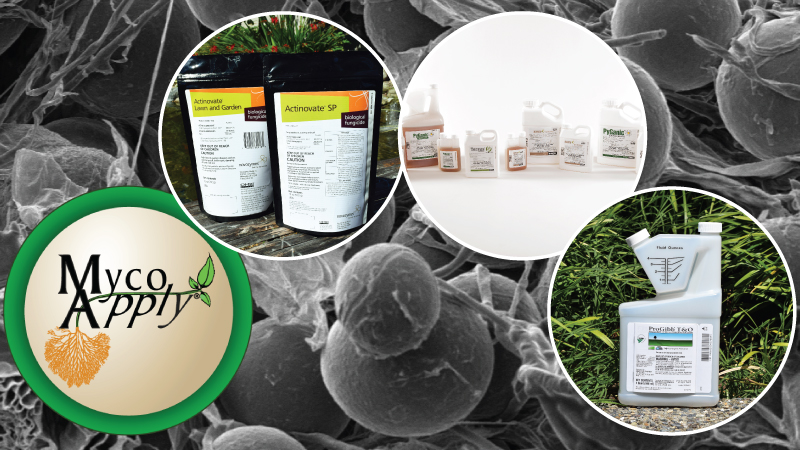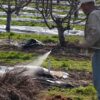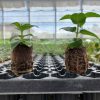Mycorrhizal Applications has been a leader in the production and commercialization of mycorrhizal fungi for nearly 25 years. The principal goal of the company from day one has been to learn from nature, and apply these lessons toward sustainability in all industries involving soils, plants, and people. This is the philosophy that has driven the company as we have worked over the years to educate farmers, professional horticulturists, landscape professionals, tree care professionals, and restoration and erosion control specialists about mycorrhizal fungi and the vital role that they play in every soil ecosystem. This is also the philosophy that has driven us towards broadening our portfolio of Biorational products to complement our professional line of MycoApply® mycorrhizal offerings, including botanically derived insecticides, biological fungicides, and powerful plant growth regulators, to help plant professionals achieve success and ROI while decreasing their reliance on hard chemistry, as well as increasing their overall sustainability and reducing their impact on the natural environment and the ecosystem services that a healthy environment provides.
What is Biorational Technology?
The term “Biorational” is a relatively new addition to the vocabulary of most professional growers. This new terminology describes plant care products that in some way mimic or learn from the mechanisms that plants and ecosystems have relied on in nature throughout history.
ASTM (known until 2001 as the American Society for Testing and Materials) has defined Biorational as follows:
Biorational (n.) – The Term used to characterize a broad range of low environmental impact substances or products (such as, but not limited to, agriculture, aquaculture, forestry, plant health, industrial and residential areas) typically biologically-derived or, if synthetic, structurally similar and functionally identical to a biologically occurring material with minor differences between the respective stereochemical isomer ratios derived from biological or synthetic origins. Biorationals include biopesticides as well as nonpesticidal products, such as, but not limited to, those that are used for crop stress management, enhanced plant physiology benefits, root growth management, postharvest or as an alternative control agent to pesticides and antimicrobials.
What are the Benefits of Biorational Technology?
Many of these products are listed for organic use by the Organic Materials Review Institute (OMRI), as well as the California Department of Food and Agriculture (CDFA) Organic Input Material (OIM) Program, and are often compliant with the USDA National Organic Program (NOP). Whether or not you are an organic grower, the advantages of this type of technology are still important, often including additional benefits such as shorter restricted-entry intervals (REI), shorter preharvest intervals (PHI), shorter lengths of persistence, reduced chemical runoff, and can offer reduced risks to plant care professionals who handle and apply these products than traditional “harder” chemical methods. Also, biological options like MycoApply® and Actinovate® provide a host of ecosystem services and auxiliary benefits to the plants by improving the overall ecosystem and “microbiome” of the rhizosphere of treated plants.
What is Included in Mycorrhizal Applications’ Biorational Portfolio?
Actinovate® was the first Biorational addition to our portfolio, as it works in a synergistic manner with our MycoApply® mycorrhizal inoculum, and is OMRI listed for organic use. This biological fungicide is based on a beneficial soil bacterium called Streptomyces lydicus WYEC 108, and can be applied as a drench to the soil rhizosphere and/or as a spray to the plant’s foliage. Actinovate is a versatile tool for professionals (Actinovate® SP) as well as home gardeners (Actinovate® Lawn and Garden), and utilizes several modes of action as it protects against a broad range of soil-borne and foliar fungal pathogens. Actinovate is easy to use, completely soluble, non-phytotoxic, and can be applied up to and including the day of harvest. Not only is it an effective and easy-to-use fungicide option, but it also produces several by-products within the rhizosphere to aid in plant health including siderophores and chitinase.
Mycorrhizal Applications is also the Master Distributor of MGK’s botanically-derived insecticides for Horticulture and Home Garden use, including PyGanic® Specialty, PyGanic® Gardening, EverGreen® Pro 60-6, and Azera® Gardening. The PyGanic botanical insecticides are OMRI listed, are based on active ingredients derived from organically grown plants from the chrysanthemum family, and are labeled for use against 100 common insect pest species. EverGreen® Pro 60-6 is a professional insecticide that contains botanically-derived pyrethrins, as well as a PBO synergist which increases the effectiveness of this naturally-produced pest elimination compound. Azera® Gardening is a retail home and garden insecticide that is OMRI listed and includes the “one-two punch” of organic botanically-derived insect fighting power of organic pyrethrins, along with azadirachtin (derived from Neem), and is labeled for use against more than 200 common insect pest species.
ProGibb® T&O is a powerful plant growth regulator (PGR) with gibberellic acids as its active ingredient that enhances overall plant growth, increases stem elongation, and induces flowering and fruiting of plants. ProGibb is produced by our parent company, Valent BioSciences (VBC). VBC and its predecessor Abbott Laboratories has been in the business of researching and producing Biorational PGRs since 1957, and has the largest portfolio of Biorational products in the world. ProGibb T&O is OMRI Listed for organic use, and provides multiple benefits to greenhouse and nursery crops. It has been shown to reduce crop time in many species, as well as providing a number of benefits to Bermudagrass for turf applications. This important PGR is used in bedding plants, potted plants and foliage, cut flowers, turfgrass, and field grown ornamentals and bulb crops, and it promotes plant growth through cell enlargement, elongates plant and flower stems, reduces crop time, induces flowering, fruit set, and fruiting, breaks dormancy, delays senescence, and increases seed germination.
MA’s Involvement in Biorational Partnerships and Industry Development
MA and our sister companies are members of the Biological Products Industry Alliance (BPIA), which “promotes the responsible development of safe and effective biological products including biopesticides and biostimulants as beneficial tools for commercial agriculture, forestry, golf courses, home gardens, horticulture, ornamentals, and public health through education, outreach and advocacy activities at the state, federal, and international levels.” BPIA’s mission is advancing sustainability through biological solutions. This mission is aligned with the MA’s foundation and principals, and our membership in this organization is another way in which we can commit ourselves to the advancement and adoption of this important sustainable technology.
The Future of MA’s Biorational Portfolio
At MA, we are working with our affiliates and partners in the industry to continue to build on our already well-rounded Biorational portfolio, and we will be announcing new additions to this powerful toolkit in the months to come! Future plans include the re-introduction of Actino-Iron® into the marketplace, as well as the development and launch of additional horticulture PGRs and new professional botanical insecticide products. Stay tuned for more, and sign up for our newsletter to stay in the loop.







